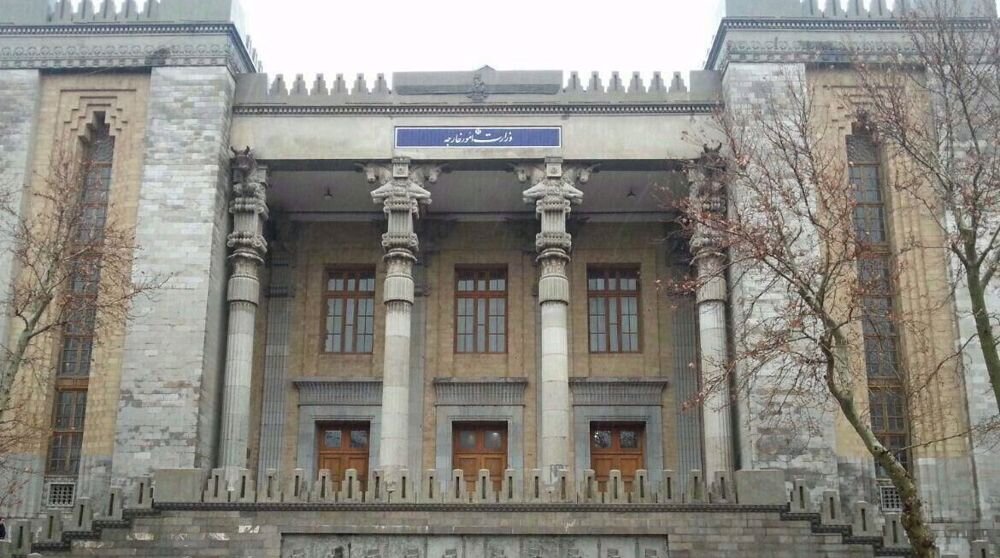Iran summons Russia envoy over meddlesome remarks

TEHRAN- In protest to a recent statement that was issued by Russia and a number of Arab nations about Iran’s three Persian Gulf islands—Abu Musa, the Greater Tunb, and the Lesser Tunb—Iran has summoned the Russian chargé d'affaires to Tehran.
On Saturday, the Russian ambassador was called by the assistant to the Iranian Foreign Ministry's director general for Persian Gulf affairs.
The event occurred when the United Arab Emirates’ unfounded allegations over the three Iranian islands were restated in the closing statement of the 6th Arab-Russian Cooperation Forum, which was held in Morocco on December 20.
The Iranian diplomat sent a written message to the Russian envoy expressing the Islamic Republic’s “strong protest” over Moscow’s continued endorsement of the “groundless claims” included in the statement.
The Russian envoy was reminded by an official from Iran’s Foreign Ministry of “the necessity of showing respect for the sovereignty and territorial integrity of all countries as one of the most recognized and fundamental principles in international relations.”
Additionally, the diplomat restated Tehran’s firm belief that “the three Iranian islands in the Persian Gulf eternally belong to Iran,” stressing that “any claim in this regard by any party is null and void and unacceptable.”
The Russian envoy, for his part, promised to quickly convey Iran’s strong objection to the authorities in his nation.
Russia affirms regard for Iran territorial integrity
In a meeting in Moscow on Saturday with Iranian ambassador to Russia Kazem Jalali, Russian Deputy Foreign Minister Mikhail Bogdanov said that Moscow reaffirmed its complete respect for Iran’s territorial integrity, adding that respect for Iran’s territorial integrity is an essential component of Russia’s foreign policy.
According to the top Russian diplomat, Moscow is dedicated to maintaining cordial ties with Iran and believes it is important to refrain from meddling in other nations’ internal issues.
During the discussion, the Iranian ambassador also stated that Iran expects Russia to refrain from misusing any attitudes or postures that would help the adversaries of the two nations’ improving ties.
In post on X on Friday, Mohsen Rezaei, the secretary of the Supreme Council for the Coordination of the Heads of Governments emphasized that Russia’s unfriendly interventions in relation to Iran’s territorial integrity should not be repeated, adding that the three islands of the Persian Gulf are not similar to the Crimean Peninsula.
He said that “Tehran has repeatedly noted that the three islands are not negotiable.”
“The UAE’s continued excesses are not in their interest and have consequences. Russia’s unfriendly interventions regarding Iran’s territorial integrity should not be repeated,” he added.
In a Friday telephone conversation between Iranian Foreign Minister Hossein Amir Abdollahian and his Russian counterpart Sergey Lavrov, Iran asserted its territorial integrity, designating the Iranian trio islands as an inseparable part of the nation's sovereign territory.
Amir Abdollahian emphasized the rejection of any claims made by external parties regarding this matter.
Amir Abdollahian acknowledged the positive and growing relations between Iran and Russia, highlighting that respecting the sovereignty and territorial integrity of countries is a fundamental principle in international relations.
The Russian Foreign Minister, on his part, echoed the importance of Iran's constructive role in promoting peace in the South Caucasus. He considered the relations between Moscow and Tehran as strategic and emphasized, “Russia has consistently respected Iran's sovereignty and territorial integrity—a policy that should never be questioned.”
Ayatollah Seyed Ali Khamenei’s top advisor, Ali Akbar Velayati, stated on Thursday that he believed the communiqué about the three Iranian islands amounted to meddling in Iran’s domestic affairs.
Decrying the communiqué, he continued, “The meeting was held in the presence of some Arabs, who are indifferent to the fate of the Palestinians, and Russian experts in Morocco and issued a statement that has various flaws, the most important of which is interference in Iran’s affairs.”
Instead of taking effective action to halt Israel’s attack in Gaza, the UAE —which has adopted a “regrettable” position against the Palestinians and supported Israel’s massacre of the oppressed people in Gaza— keeps bringing up this “baseless claim” regarding the three islands.
The spokesperson for the Iranian Foreign Ministry debunked the accusations regarding the three Iranian islands on Thursday in a separate statement, calling them “baseless and unacceptable.”
Nasser Kanaani underscored that “the Iranian islands of Abu Musa, the Greater Tunb and the Lesser Tunb, located in the blue waters of the Persian Gulf, eternally belong to Iran and are an inseparable part of the Islamic Republic of Iran’s land.”
“The Islamic Republic of Iran does not consider its territorial integrity and sovereignty over the three islands negotiable and rejects any claim by any side on the issue and will not back down from its sovereignty and territorial rights in any way,” he added.
Throughout history, the three islands of Abu Musa, the Greater Tunb, and the Lesser Tunb in the Persian Gulf have consistently been acknowledged as integral parts of Iran. This assertion finds backing in numerous historical, legal, and geographical documents, both within the country and worldwide.
Despite the substantial evidence supporting Iran's historical claim, the United Arab Emirates has consistently challenged the Iranian sovereignty over these islands.
The islands came under British control in 1921. However, on November 30, 1971, shortly after British forces withdrew from the region and just two days before the formal establishment of the UAE federation, Iran reclaimed sovereignty over the islands.
Leave a Comment